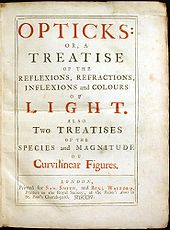|
Home
|
Dec 22, 2014
This week’s themeWords from science that have different senses in everyday use This week’s words optics epicenter quantum theory entropy 
1st edition of Opticks by Newton who got so much done because he didn't worry about the optics (sense 2) of things
Photo: Wikimedia
A.Word.A.Day
with Anu GargAdam Smith once said, “Science is the great antidote to the poison of enthusiasm and superstition.” What did the great economist have against enthusiasm? To find out we’ll have to go back to his time. Smith was born in 1723. The literal meaning of the word enthusiasm still applied at the time. The word is coined from Greek theos (god). So if you had enthusiasm, you were supposed to be possessed by a god or displaying religious emotion. With time we are going away from such “enthusiasm” and superstition. And with time, words are also developing new meanings. This week we’ll feature five words from the world of science that have also developed different meanings in day-to-day language. optics
PRONUNCIATION:
MEANING:
noun: 1. The study of light, vision, etc. 2. The way a situation or action is perceived by the public. ETYMOLOGY:
From French optique, from Latin opticus, from Greek optikos, from
ops (eye). Earliest documented use: 1579; for sense 2: 1973.
USAGE:
“Timothy Geithner worried about the optics of going into finance.
‘I think the perception problem ... is very damaging to me.’” Andrew Ross Sorkin; ‘Up to My Neck in This Crisis’; The New York Times Magazine; May 11, 2014. See more usage examples of optics in Vocabulary.com’s dictionary. A THOUGHT FOR TODAY:
It may sound trite, but using the weapons of the enemy, no matter how good one's intentions, makes one the enemy. -Charles de Lint, writer and folk musician (b. 1951)
|
|
Subscriber Services
Awards | Stats | Links | Privacy Policy
Contribute | Advertise
Awards | Stats | Links | Privacy Policy
Contribute | Advertise
© 1994-2026 Wordsmith